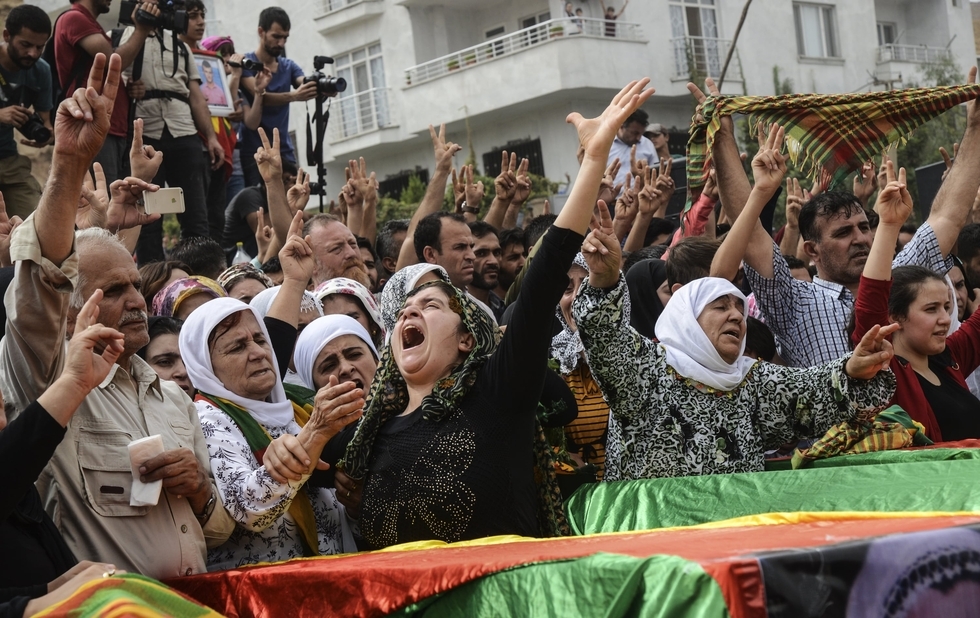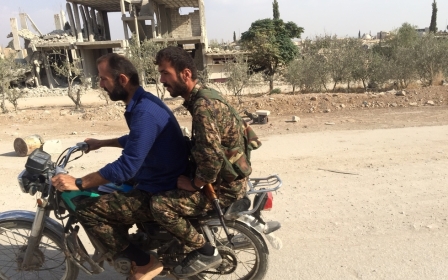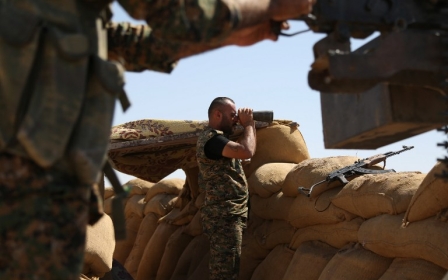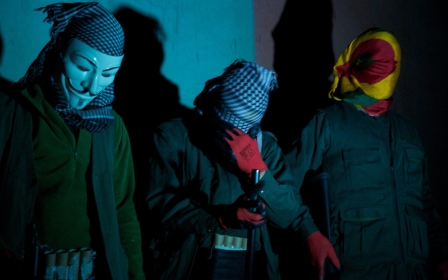Wave of anti-Kurd attacks in Turkey spark fears of potential pogrom

ISTANBUL, Turkey - Isaac, a 29-year old who works in a downtown Istanbul restaurant, does not identify with any of Turkey’s political parties. He is not just apolitical but rather anti-political: a self-described anarchist who says he’s long felt politically disillusioned.
Yet hard as he tries to immunise himself from politics, he happens to be a Kurd at a particularly tense period in Turkey’s recent history.
Increasing anti-Kurdish sentiment is palpable, he says, alongside isolated but regular reports of Kurds being verbally and physically assaulted and businesses attacked in various urban centres. For this reason, Isaac says he is reluctant to speak Kurdish in public, particularly in areas with a known hardline-nationalist bent.
The signing of a ceasefire in 2013 put an end to a decades-long conflict between the separatist Kurdistan Workers’ Party (PKK) and the Turkish army, which has seen over 40,000 killed to date, and brought about improved relations between Kurds and ethnic Turks. However, this tenuous peace deal was shattered in the wake of an Islamic State group suicide bomb at a gathering of pro-Kurdish youths the southern city of Suruc in July.
Two days later, the PKK, which accused the government of tacitly endorsing the incident, murdered two policemen in their sleep, prompting the Turkish airforce to carry out airstrikes on positions of Kurdish militants in northern Iraq, and the army to attack PKK positions in eastern Turkey.
On 6 and 8 September, the PKK carried out bombings on an army convoy and a police bus which killed 16 and 14 respectively. These attacks in particular are responsible for the sharp increase in anti-Kurdish sentiment in recent weeks, sparking anti-Kurdish riots and attacks across numerous Turkish cities.
It is difficult to get a sense of these tensions in most parts of central Istanbul, which is perennially bustling with commerce and tourism. But just a 20-minute taxi ride north of the iconic Taksim Square, the working-class neighbourhood of Okmeydani is palpably different. Home to a sizeable Kurdish population, Okmeydani grabbed headlines for the wrong reasons in October 2014 when members of the PKK’s youth branch, the YDG-H, clashed with security forces.
Those particular clashes were sparked after the PKK accused the government of preventing Kurds from crossing the Syrian border to support Kurdish fighters resisting the Islamic State group in Kobane. But several non-Kurdish residents of Okmeydani said the clashes were not an isolated incident and gave a sense of relations between ethnic Turks and Kurds in the area.
“PKK supporters regularly stop buses and traffic in the neighborhood over one grievance or another. It’s disrupting and causes traffic jams,” said 32-year old Migit, a taxi driver based in Okmeydani who, like everyone else interviewed for this piece, asked not to use his full name. “I have Kurdish friends and my father’s business partner is a Kurd, yet in the event of a war I wouldn’t feel safe around them. In the end, they would side with other Kurds over us.”
Sometimes tensions turn even more violent. “Istanbul has become far more tense [in the past few weeks],” says Bayram, a 35-year-old accountant who preferred to withhold his surname. Bayram, who comes from the southeast town of Diyarbakir but lives in Istanbul, cited the case of Sedat Akbas, a fellow Kurd who was stabbed by a group of nationalists not far from Okmeydani in early September.
Although Istanbul’s police issued a statement saying Akbas had been killed after attacking a group of people, several sources claim that he was attacked merely because he spoke Kurdish on his phone in front of the wrong people.
While violence between Kurds and ethnic Turks spans decades, incidents in cities in western Turkey are a relatively new development according to Gareth Jenkins, a Turkey expert who has lived in Istanbul for over 20 years. The shift in dynamics can largely be attributed to the mass migration of Kurds who fled their home in search of peace and economic opportunity in the 1990s.
Although statistics are hard to come by, Jenkins estimates that some four million Kurds - the largest concentration of Kurds in one place - live in Istanbul, making up between 20-25 per cent of its population. Considering these demographics, it is not surprising that developments in the southeast reverberate across the country.
Typically, the most disturbing stories and images coming out of the on-going conflict in the southeast are shared on social media. Isaac, the restaurateur, displayed several Facebook pages which included images of a 10-year-old boy and a hospitalised Kurdish MP, Caglar Dmirel. But by far the most distressing image for Isaac was that of 10-year-old Cemile Cagirga, whose family kept her dead body in a freezer for several days until a week-long curfew in the flashpoint eastern town of Cizre was lifted and a funeral could be held.
“Can you imagine how devastating it is for a family to have to freeze their own child?” he asked rhetorically.
Such images and reports of PKK violence certainly inspire individual attacks on both sides, yet it is worth noting that attacks in the past month have not been limited to isolated incidents. Rather, some of the most significant attacks have been carried out by politically motivated mobs. Across Turkey, over 100 offices of the pro-Kurdish Peoples' Democratic Party (HDP), which secured the third largest share of seats in the July elections and denied the ruling AKP a simple majority, were attacked in early September.
A mob chanting pro-AKP slogans was behind the recent attack on the headquarters of the prominent Hurriyet newspaper. The attackers accused the paper of misquoting a speech made by President Recep Tayyip Erdogan discussing the crisis.
In the past two weeks the situation across urban centres appears to have improved, with few reports of ethnically-inspired violence. But latent tensions remain, and scenes from places like Besiktas, a neighbourhood in Istanbul where one of Turkey’s most successful football teams is located, ultra-nationalists were heard calling for a “massacre” of Kurds, according to Jenkins.
In the Mediterranean city of Izmir, moreover, Jenkins recounted meeting a Kurdish shop owner who said that he and fellow Kurds had formed contingency plans in the event of a pogrom.
“Make no mistake, among some Kurds such fears are very real.”
New MEE newsletter: Jerusalem Dispatch
Sign up to get the latest insights and analysis on Israel-Palestine, alongside Turkey Unpacked and other MEE newsletters
Middle East Eye delivers independent and unrivalled coverage and analysis of the Middle East, North Africa and beyond. To learn more about republishing this content and the associated fees, please fill out this form. More about MEE can be found here.




